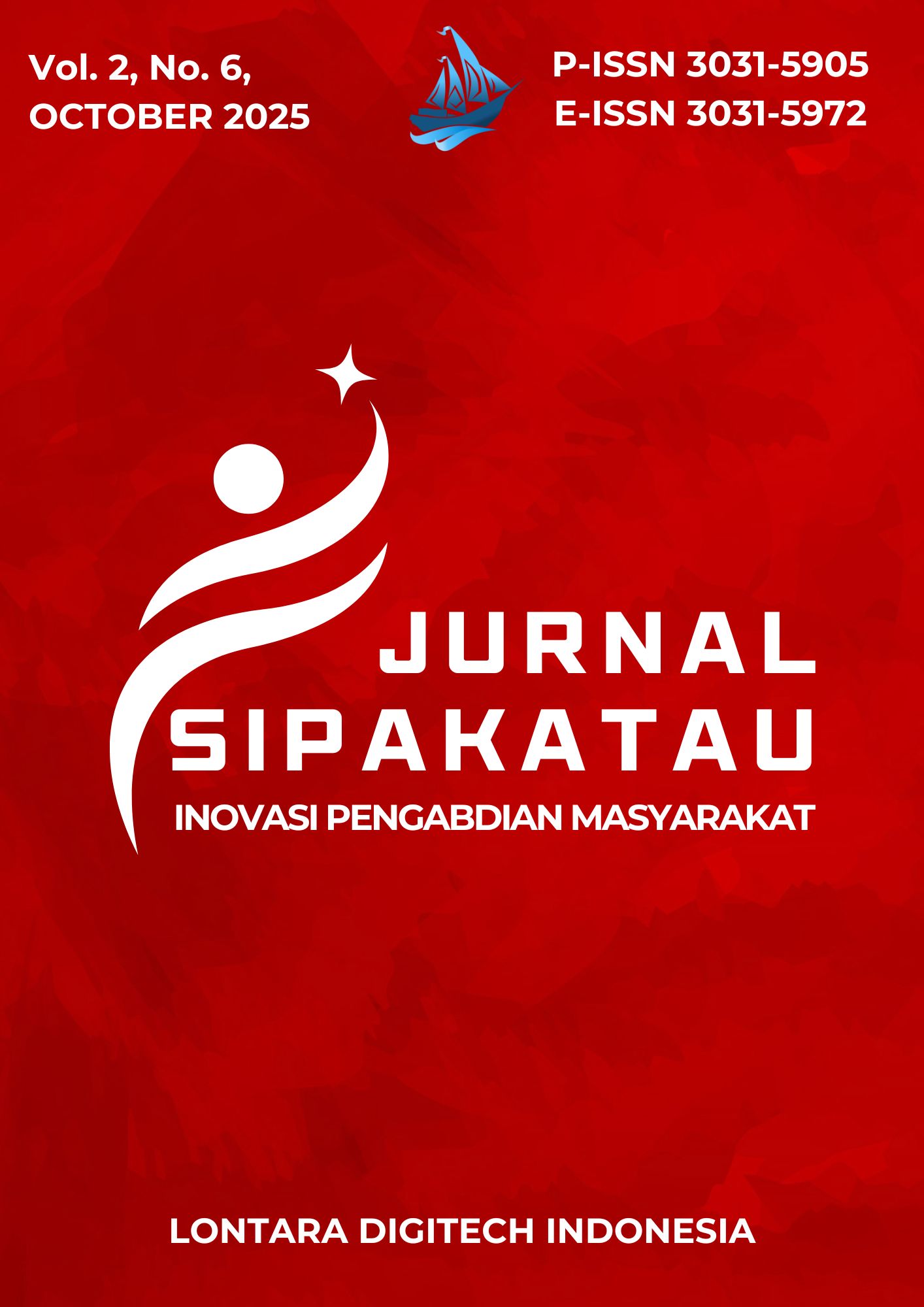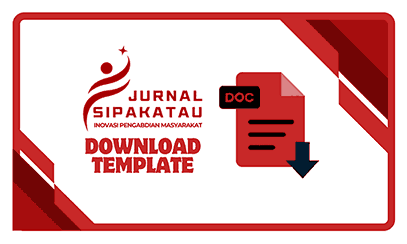Enhancing the Capacity of Prospective Young Entrepreneurs in Schools through Financial Literacy Training and the Utilization of Artificial Intelligence
DOI:
https://doi.org/10.61220/jsipakatau.v2i6.2539Keywords:
financial literacy, artificial intelligence, young entrepreneursAbstract
The rapid development of digital technology and artificial intelligence (AI) has significantly transformed education and entrepreneurship. However, many young school entrepreneurs still face limitations in financial literacy, technological understanding, and the use of data to support business decision-making. These conditions create challenges in equipping them with adaptive and innovative entrepreneurial competencies in the digital era. This community service program aims to enhance the capacity of young prospective entrepreneurs through financial literacy training and the utilization of artificial intelligence. The implementation method consisted of three main stages: preparation, implementation, and evaluation. The preparation stage included initial observations, the development of training modules, and the design of evaluation instruments. The implementation stage involved financial literacy training and AI-based training, particularly in business simulation and data visualization. Evaluation was carried out using participant satisfaction surveys as well as pre-test and post-test assessments to measure improvements in knowledge and skills. The results indicated a significant increase in participants’ understanding of financial literacy, business budgeting, AI concepts, and data visualization skills. Participant satisfaction surveys revealed that most participants expressed satisfaction and high appreciation for the training materials and delivery methods. This program successfully addressed the identified problems and contributed to preparing inclusive, adaptive, and competitive young entrepreneurs in the era of digital transformation.
References
Anggraeni, A. A., & Tandika, D. (2019). Pengaruh financial literacy dan financial attitude terhadap financial management behavior. Prosiding Manajemen, 5(1), 85–92.
Bae, S. (2022). The mediating effect of digital literacy on the relationship between smartphone use motives and life satisfaction for senior citizens in Korea. Iranian Journal of Public Health.
Cheng, Y. (2023). Research on the impact of the development of digital financial inclusion on multidimensional poverty. Frontiers in Business, Economics and Management, 7(3), 42–45. https://drpress.org/ojs/index.php/fbem/article/view/5275
Collins, K. (2023). Impact of artificial intelligence on accounting, auditing and financial reporting. American Journal of Computing and Engineering, 6(1), 29–34. https://ajpojournals.org/journals/index.php/AJCE/article/view/1433
Emenike, M. E., & Emenike, B. U. (2023). Was this title generated by ChatGPT? Considerations for artificial intelligence text-generation software programs for chemists and chemistry educators. Journal of Chemical Education, 100(4), 1413–1418. https://doi.org/10.1021/acs.jchemed.3c00063
Isma, A., Rosidah, R., Rahman, S. S., Nasrullah, N., Syam, A. S., & Sari, N. (2023). Analisis penggunaan chatbot berbasis AI pada model hybrid di Jurusan Teknik Informatika dan Komputer. Journal of Vocational, Informatics and Computer Education, 79–92.
Jiang, Y., Li, X., Luo, H., Yin, S., & Kaynak, O. (2022). Quo vadis artificial intelligence? Discover Artificial Intelligence, 2(1), 4. https://doi.org/10.1007/s44163-022-00022-8
Keck, M., Huron, S., Panagiotidou, G., Stoiber, C., Rajabiyazdi, F., Perin, C., et al. (2023). EduVis: Workshop on visualization education, literacy, and activities. arXiv. http://arxiv.org/abs/2303.10708
Marinov, K. M. (2023). Financial literacy: Determinants and impact on financial behaviour. Economic Alternatives, 2023(1), 89–114. https://doi.org/10.37075/EA.2023.1.05
Naganjani, U., & Sita, V. (2023). Toward a digital competency framework: An assessment model for micro small and medium enterprises in the era of digital India. SEDME: Small Enterprises Development Management & Extension Journal.
Orji, U. E., Ukwandu, E., & Obianuju, E. A. (2022). Visual exploratory data analysis of the COVID-19 pandemic in Nigeria: Two years after the outbreak.
Piin, L. P., & Nagalingham, S. (2023). Visualization of business intelligence insights into aviation accidents. International Journal of Advanced Computer Science and Applications, 14(1). http://thesai.org/Publications/ViewPaper?Volume=14&Issue=1&Code=IJACSA&SerialNo=94
Su, J., & Yang, W. (2024). AI literacy curriculum and its relation to children’s perceptions of robots and attitudes towards engineering and science: An intervention study in early childhood education. Journal of Computer Assisted Learning, 40(1), 241–253. https://doi.org/10.1111/jcal.12867
Triana, L., & Ibrohim, I. (2022). Factors affecting student financial literacy. Ilomata International Journal of Tax and Accounting, 3(4), 421–434. https://doi.org/10.52728/ijtc.v3i4.591
Wati, M. M. (2023). Preferensi generasi milenial dalam financial, money ethics dan fintech serta dampaknya pada financial management behavior melalui financial literacy. ECOBESTHA, 2, 51–78.
Wu, J., & Zhang, Y. (2023). Innovation and entrepreneurship education (IAEE) driven by artificial intelligence (AI). In B. Fox, C. Zhao, & M. T. Anthony (Eds.), Proceedings of the 2022 3rd International Conference on Artificial Intelligence and Education (IC-ICAIE 2022) (pp. 1003–1008). Atlantis Press International BV. https://doi.org/10.2991/978-94-6463-040-4_151
Xu, F., Zhang, X., & Zhou, D. (2023). Does digital financial inclusion reduce the risk of returning to poverty? Evidence from China. International Journal of Finance & Economics.
Yang, W., Hu, X., Yeter, I. H., Su, J., Yang, Y., & Lee, J. C. (2023). Artificial intelligence education for young children: A case study of technology-enhanced embodied learning. Journal of Computer Assisted Learning.
Yanto, H., Kiswanto, K., Baroroh, N., Hajawiyah, A., & Rahim, N. M. (2022). The roles of entrepreneurial skills, financial literacy, and digital literacy in maintaining MSMEs during the COVID-19 pandemic. Asian Economic and Financial Review, 12(7), 504–517. https://archive.aessweb.com/index.php/5002/article/view/4535
Downloads
Published
Issue
Section
License
Copyright (c) 2025 Sitti Hajerah Hasyim, Hajar Dewantara, Andika Isma, Hasisa Haruna, Andi Anggi Kemalasari (Author)

This work is licensed under a Creative Commons Attribution-ShareAlike 4.0 International License.







 Email: sipakatau@lontaradigitech.com
Email: sipakatau@lontaradigitech.com
